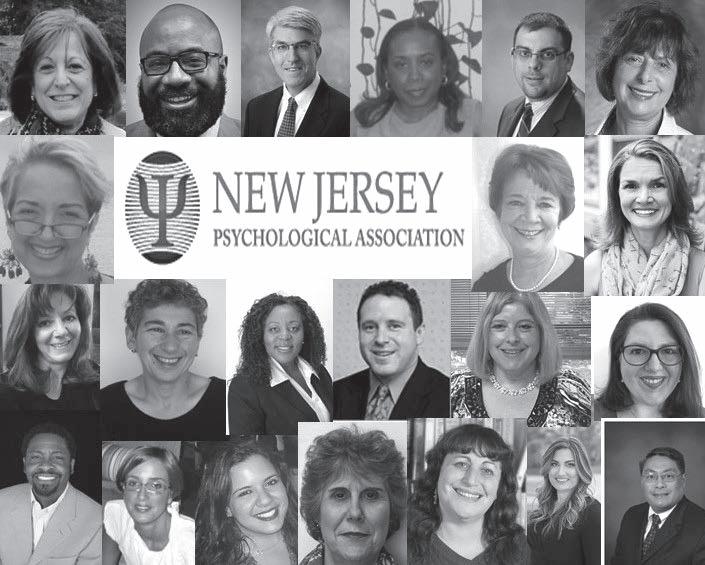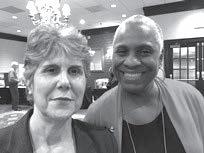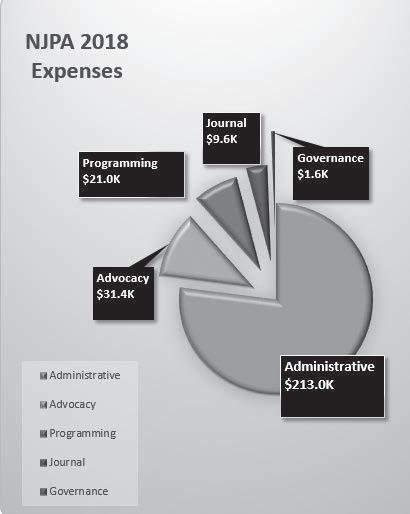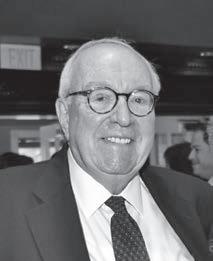NJ PSYCHOLOGIST

A Publication of the New Jersey Psychological Association A n n u a l R e p o r t & C o n f e r e n c e B r o c h u r e
A n n u a l R e p o r t & C o n f e r e n c e B r o c h u r e
I N T H I S I S S U E
I N T H I S I S S U E
E x e c u t i v e S u m m a r y
E x e c u t i v e S u m m a r y
Y o u r A s s o c i a t i o n
F i n a n c i a l S t a t u s
Y o u r A s s o c i a t i o n F i n a n c i a l S t a t u s F a l l C o n f e r e n c e
F a l l C o n f e r e n c e
Summer 2018 | VOLUME 68 | NUMBER 3
W W W . P S Y C H O L O G Y N J . O R G 2 0 1 8
Register Now!
All You Want to Know about Medicare and Quality Reporting: The APAPO/APA Mental and Behavioral Health Registry
Friday, September 28, 2018
The Elan
111 Route U.S. 46 West, Lodi, NJ 07644
9:30-10:00 AM Buffet Breakfast and Registration
10:00-1:00 PM Program
11:00-11:15 Break
3 CE Credits
Overall Workshop Description:
Performance accountability is coming to mental and behavioral healthcare. Providers are expected to collaborate and address the health care needs of patients more efficiently, and the emergence of new reimbur sement mechanisms is replacing fee-for-service payment The Center for Medicare and Medicaid Services (CMS) has created multiple initiatives and is promulgating regulations that are evolving swiftly. The shift towards value-based payment may feel unsettling and intrusive to many psychologists. Most psychologists were never trained or expected to track or report outcome data from their personal pract ices; many have never seen their own outcome data The question is not whether psychologists will be impacted by performance accountability, but rather how much influence psychologists will have on the process, as it unfolds over the next decade. This, in turn, has implications for professional practice in psychology, such as the increasing demand for quality metrics, and payment reforms.
The goal o f this program is to educate psychologists about quality measurement reporting, by reviewing recent federal regulations (i.e., Medicare) and research, with an emphasis on exploring both the potential benefits and challenges for clinicians. The presenters will provide an overview and discuss the history leading up to APA and APAPO’s initiative to develop a Qualified Clinical Data Registry (QCDR), a CM S-approved outcome dataset that will allow practitioners to track quality progress and outcomes on their clients. They will highlight how developing a new QCDR specific to mental and behavioral health care, called the Mental and Behavioral Health Registry (MBHR), will have an impact on professional practice, health care outcomes, clinical research, and training future providers. They will demonstrate the use of the new Mental and Behavioral Health Registry.
At the conclusion of this prese ntation , attendees should be able to :
1) Describe the benefits and barriers to measuring quality in your professional practice
2) Summarize the Merit-Based Incentive Payment System (MIPS) and apply the relevant aspects of the law to your professional practice
3) Explain the role the Mental and Behavioral Health Registry plays in the future of professional psychologic al practice and psychological science
4) Assess the impact of anticipated psychotherapy changes on my practice
5) Evaluate and implement measures of patient progress toward treatment goals
6) List the key features of the Mental and Behavioral Health Registry (MBHR)
7) Describe how to use the MBHR in clinical practice
8) Explain the strength of patient report measures
9) Describe applicabilit y to diverse population
Presenters:
Caroline Vaile Wright, PhD Director of Research
American
and Special Projects
Psychological Association
Carol D. Goodheart, EdD Independent Practice
Chair, APAPO Advisory Committee for the Development of a Qualified Clinical Data Registry
The presenters do not have any commercial support and/ or conflict for interest for this program This workshop is sponsored by NJPA. NJPA is approved by the American Psychological Association to offer continuing education for psychologists. NJPA maintains responsibility for this program and its content. NJPA does not endorse the presented material as the only approach to a given area of study or therapeutic approach NJPA ensures that permission to use proprietary information, and steps to safeguard such information, are discu ssed with presenters at NJPA co-sponsored programs. No materials (physical or electronic) provided to attendees at such programs may be shared.
Target Audience:
Psychologists, Psychiatrists, Social Workers, Graduate Students
Program sophistication: Introductory: no prior knowledge of the specific topic is required
ADA accommodations available upon request. Requests mus t be made at least 14 days prior to the event. Please contact njpaad@psychologynj org for more details
Registration Policies:
On–Site Registration fees will increase by $20 and will only be accommodated if there is space. If the program sells out, there will be no on-site registration Refunds less a $25 administrative fee will be granted until September 10th 2018 No refunds after September 10, 2018
NJPA, 414 Eagle Rock Ave, Suite 211, West Orange, NJ 07052
● Fax: 973-243-9818
● Email NJPA@PsychologyNJ.org
NJPA
Member: $120 NJPA Sustaining Member: $102 NJPA ECP: $90 NJPA Student Member: $60 Non Member: $240 Register online at www.psychologynj.org/upcoming-events
Table of Contents
Table of Contents
Meet the Executive Board
Meet the Executive Board
Who We Are Today and Where We Are Going in 2018
We're Working For You!
Who We Are Today and Where We Are Going in 2018
Get Connected
The Financial Corner
We're Working For You! Get Connected
The Financial Corner
Advocating For You
Serving the Under-Served: The NJPA Foundation
Advocating For You
Serving the Under-Served: The NJPA Foundation


Our Community
2018 Fall Conference Schedule
Our Community
Committee on Diversity & Inclusion (CODI) CE Program:
2018 Fall Conference Schedule
Committee on Diversity & Inclusion (CODI) CE Program: Engaging Clients Across the Divides: Using the New APA Multicultural Guidelines
Engaging Clients Across the Divides: Using the New APA Multicultural Guidelines
Morning Session with Featured Speaker: Paul Wachtel, PhD
Morning Session with Featured Speaker: Paul Wachtel, PhD
Attachment, Anxiety, and the Synergistic Impact of a Psychodynamic/ Cognitive Behavioral Integration
Attachment, Anxiety, and the Synergistic Impact of a Psychodynamic/ Cognitive Behavioral Integration
Afternoon Session with Featured Speaker: Paul Wachtel, PhD
The Gentle Path to Insight
Afternoon Session with Featured Speaker: Paul Wachtel, PhD
Discussion & Video Demonstration
The Gentle Path to Insight
Discussion & Video Demonstration
Afternoon Session: Presenter Joshua Zavin, PhDTwo Aspects of Integration
Afternoon Session: Presenter Joshua Zavin, PhDTwo Aspects of Integration
Afternoon Session: Presenter Kenneth Frank, PhD -
Developments in Psychotherapy Integration: A Relational Perspective
Afternoon Session: Presenter Kenneth Frank, PhD -
Fall Conference Registration Form
Our Mission
Our Mission
Domestic Violence and PTSD
Developments in Psychotherapy Integration: A Relational Perspective Fall Conference Registration Form
Domestic Violence and PTSD
Executive Board
Executive Board
the advancement of psychology as a science, as a profession, and as a means of promoting health and human welfare in an atmosphere that supports the diversity of its members and society at large.
the advancement of psychology as a science, as a profession, and as a means of promoting health and human welfare in an atmosphere that supports the diversity of its members and society at large.
President: Stephanie Coyne, PhD; President-Elect: Morgan Murray, PhD; Past-President: Hulon Newsome, PsyD; Secretary: Phyllis Bolling, PhD; Treasurer: Daniel DaSilva, PhD; Parliamentarian: Osna Haller, PhD; Members-at-Large: Tammy Dorff, PsyD, Alison Winston, PhD, Luciene Takagi, PsyD, Mary Blakeslee, PhD, Randy Bressler, PsyD, Alan Lee, PsyD; APA Council Representative: Caridad Moreno, PhD; NJPAGS Chair: Alexandra Gil; Affiliate Caucus Chair: Rosalie DiSimone-Weiss, PhD; NJ Chapter of Association of Black Psychologists Representative: TBD; CODI Co- Chairs: Caridad Moreno, PhD, Lale Bilginer, PhD; Latino/Mental Health Association of NJ
President: Stephanie Coyne, PhD; President-Elect: Morgan Murray, PhD; Past-President: Hulon Newsome, PsyD; Secretary: Phyllis Bolling, PhD; Treasurer: Daniel DaSilva, PhD; Parliamentarian: Osna Haller, PhD; Members-at-Large: Tammy Dorff, PsyD, Alison Winston, PhD, Luciene Takagi, PsyD, Mary Blakeslee, PhD, Randy Bressler, PsyD, Alan Lee, PsyD; APA Council Representative: Caridad Moreno, PhD; NJPAGS Chair: Alexandra Gil; Affiliate Caucus Chair: Rosalie DiSimone-Weiss, PhD; NJ Chapter of Association of Black Psychologists Representative: TBD; CODI Co- Chairs: Caridad Moreno, PhD, Lale Bilginer, PhD; Latino/Mental Health Association of NJ Representative: TBD; Director of Academic Affairs: Francine Conway, PhD; Affiliate Representatives: Alison Winston, PhD (Northeast Counties Association of Psychologists), Sara Tedrick Parikh, PhD (Essex/Union County Association of Psychologists), Tammy Dorff, PsyD (Middlesex County Association of Psychologists), Tamara Latawiec, PsyD (Monmouth/Ocean County Psychological Association), Randy Bressler, PsyD (Morris County Psychological Association), Janie Feldman, PsyD (Somerset/Hunterdon County Psychological Association), Daniel Lee, PsyD (South Jersey Psychological Association); Executive Director, Keira Boertzel-Smith, Director of Professional Affairs, Judith Glassgold, PsyD.
Representative: TBD; Director of Academic Affairs: Francine Conway, PhD; Affiliate Representatives: Alison Winston, PhD (Northeast Counties Association of Psychologists), Sara Tedrick Parikh, PhD (Essex/Union County Association of Psychologists), Tammy Dorff, PsyD (Middlesex County Association of Psychologists), Tamara Latawiec, PsyD (Monmouth/Ocean County Psychological Association), Randy Bressler, PsyD (Morris County Psychological Association), Janie Feldman, PsyD (Somerset/Hunterdon County Psychological Association), Daniel Lee, PsyD (South Jersey Psychological Association); Executive Director, Keira Boertzel-Smith, Director of Professional Affairs, Judith Glassgold, PsyD.
Central Office
Central Office
Executive Director: Keira Boertzel-Smith; Director of Professional Affairs: Judith Glassgold, PsyD; Senior Communications Manager: Christine Gurriere; CE & Foundation Coordinator: Ana DeMeo; Liz DeStefano: Membership & Administrative Assistant; Bookkeeper: Marion Medow.
Executive Director: Keira Boertzel-Smith; Director of Professional Affairs: Judith Glassgold, PsyD; Senior Communications Manager: Christine Gurriere; CE & Foundation Coordinator: Ana DeMeo; Liz DeStefano: Membership & Administrative Assistant; Bookkeeper: Marion Medow.
Preparation of Manuscripts
All manuscripts submitted for publication should follow APA style. Manuscripts should be edited, proofread, and ready for publication. Please prepare your manuscript in a word-processing program compatible with MS Word using Times New Roman font in 12 point type, left flush. Please submit your manuscript via e-mail to NJPA Central Office and to Gianni Pirelli at e-mail addresses below.
Editorial Policy
Articles accepted for publication will be copyrighted by the Publisher and the Publisher will have the exclusive right to publish, license, and allow others to license, the article in all languages and in all media; however, authors of articles will have the right, upon written consent of the Publisher, to freely use of their material in books or collections of readings authored by themselves. It is understood that authors will not receive remuneration for any articles submitted to or accepted by the New Jersey Psychologist
Any opinions that appear in material contributed by others are not necessarily those of the Editors, Advisors, or Publisher, nor of the particular organization with which an author is affiliated.
Manuscripts should be sent to the Editor: Gianni Pirelli, PhD
E-Mail: gpirelli@gmail.com or NJPA Central Office
E-Mail: NJPA@PsychologyNJ.org
Published by: New Jersey Psychological Association 414 Eagle Rock Avenue, Suite 211 West Orange, NJ 07052 973-243-9800 • FAX: 973-243-9818
E-Mail: NJPA@PsychologyNJ.org
Web: www.PsychologyNJ.org
New Jersey Psychologist (USPS 7700, ISSN# 2326098X) is published quarterly by New Jersey Psychological Association, 414 Eagle Rock Avenue, Suite 211, West Orange, NJ 07052. Members receive New Jersey Psychologist as a membership benefit. Periodicals postage pending at West Orange, NJ and additional mailing offices.
POSTMASTER: Send address changes to New Jersey Psychologist, 414 Eagle Rock Avenue, Suite 211, West Orange, NJ 07052.
1
1. 2. 3. 4. 5. 6. 7. 8. 9. 10 11. 12. 13. 14. 15.
1. 2. 3. 4. 5. 6. 7. 8. 9. 10 11. 12. 13. 14. 15.
Who We Are Today, and Where We Are Going in 2018
by Stephanie Coyne, PhD & Keira
NJPA is excited to produce our third annual business report for the purpose of transparency, accountability, and telling our story. We are an association of approximately 1600 members, all of whom are invested in the business and science of psychology. We are fortunate to have long time members, who hold important NJPA institutional history, brand new members who have innovative ideas and expectations for their professional association, and members in the middle of the past and present association realities. This makes for a diverse body of individuals,
professional backgrounds, work settings, types of work, and professional life stages. We had the pleasure of meeting and visiting with members at our continuing education programs and are delighted to see the wide range of people who care about our mission. We are charged with representing all members, and we hope that this annual report presents our 2018 mid-year story to you. In this report, you will learn about our governance, financial status, board members, professional staff, advocacy update, Fall Conference continuing education programs, and how to get involved. This year we added quarterly leadership e-reports to keep our members upto-date and included the opportunity to talk directly with us via quarterly virtual meetings. We look forward to getting to know you. Please feel free to reach out to us with any questions. We're

Executive Director: Keira Boertzel-Smith njpakbs@psychologynj.org
Carries out the policies and directives of the NJPA executive board, manages the finances, oversees the communications, membership, and continuing education staff, and participates in the Council of Executives of State, Provincial (and territorial) Psychological Associations (CESPPA) meetings, APA/APAPO Practice Leadership Conference as chair-elect. She is executive director of the NJP-Political Action Committee, and NJPA Foundation.


Senior Communications Manager:
Christine Gurriere njpacg@psychologynj.org
Manages all internal and external communications including the Friday Update, e-newsletter, and NJ Psychologist, website management, social media, public and media relations, and non-dues revenue. Handles all accounts receivable.
Bookkeeper
Marion Medow

Processes all accounts payable and bank
reconciliations and deposits,
administers payroll, reserve accounts, tax statements, and prepares reports for the executive board.
Director of Professional Affairs: Judith Glassgold, PsyD njpadpa@psychologynj.org


Provides consultation every Tuesday (10am - 4pm) with members. She fields calls relating to insurance matters, Medicare/Medicaid, retirement, business practices, complex clinical issues, licensure, telehealth, and other professional concerns. Monitors national and local trends in healthcare that impact psychologists.


CE & Foundation Coordinator: Ana DeMeo njpaad@psychologynj.org


Manages all NJPA programs and
conferences, administers all CE co- sponsorship for affiliates and outside groups, liaison to the APA Office of Continuing Education. She also administers Foundation Grant Making.
Meet our newest staff member, Liz DeStefano, in an upcoming Friday Update!

here to help!
website is a great resource for the public and members.
your online profile,
history,
Visit the NJPA Website!
www.psychologynj.org Our
Find
event
invoices, NJPA message history, practice resources, practice forms, member benefits, executive board meeting information, strategic plan and bylaws, committees, special interest and resource groups, and so much more!
Boertzel-Smith especially when you add in various demographics, 2
W e ' r e W o r k i n g F o r Y o u !
N J P A i s g u i d e d b y t w o i m p o r t a n t d o c u m e n t s : o u r b y l a w s a n d s t r a t e g i c p l a n T h e b y l a w s o u t l i n e t h e o p e r a t i o n a n d m a n a g e m e n t o f t h e a s s o c i a t i o n i n c l u d i n g m e m b e r s h i p , c o n d u c t o f m e e t i n g s , a f f i l i a t e g r o u p s , a m e n d m e n t s , e x e c u t i v e b o a r d , n o m i n a t i o n s , e x e c u t i v e d i r e c t o r , a n d c o m m i t t e e s . O u r s t r a t e g i c p l a n o u t l i n e s o u r l o n g - t e r m s t r a t e g i e s t h a t d e f i n e t h e o r g a n i z a t i o n ' s d i r e c t i o n a n d t h e r e s o u r c e s n e c e s s a r y t o a c h i e v e o u r g o a l s . Y o u c a n f i n d o u r b y l a w s a n d s t r a t e g i c p l a n i n t h e M e m b e r s O n l y s e c t i o n o f o u r w e b s i t e ( w w w p s y c h o l o g y n j o r g )
N E W ! L e a d e r s h i p Q u a r t e r l y R e p o r t O u r i n a u g u r a l i s s u e o f t h e L e a d e r s h i p Q u a r t e r l y R e p o r t h i t e - m a i l b o x e s o n M a y 2 1 s t a n d t h e Q 3 i s s u e w a s s e n t i n A u g u s t T h e p u r p o s e o f t h e q u a r t e r l y r e p o r t i s t o p r o v i d e t r a n s p a r e n c y t o m e m b e r s o n a s s o c i a t i o n b u s i n e s s W e e n c o u r a g e y o u t o s u b m i t a s u g g e s t i o n i n t h e M e m b e r S u g g e s t i o n B o x a n d i n v i t e y o u t o e n g a g e w i t h N J P A l e a d e r s h i p d u r i n g a v i r t u a l c o n v e r s a t i o n . L o o k f o r t h e n e x t q u a r t e r l y r e p o r t t o r e a c h y o u r e - m a i l b o x i n t h e l a s t q u a r t e r o f t h e y e a r .
2 0 1 8 P r e s i d e n t i a l T a s k F o r c e U p d a t e N J P A t a s k f o r c e s a r e t i m e - l i m i t e d a n d m i s s i o n r e l a t e d g r o u p s t h a t s e r v e t h e e x e c u t i v e b o a r d . T h e p r e s i d e n t c o n v e n e s t a s k f o r c e s , a p p o i n t s c h a i r s , a n d a p p r o v e s m e m b e r s . I n 2 0 1 8 , t h e f o l l o w i n g t a s k f o r c e s a r e b e i n g e s t a b l i s h e d t o m o v e t h e a s s o c i a t i o n ' s w o r k f o r w a r d :
C o l l e a g u e A s s i s t a n c e T a s k F o r c e - t o f o s t e r h e a l t h a n d w e l l n e s s i n o u r m e m b e r s a n d t o a s s i s t o u r m e m b e r s i n a d d r e s s i n g t h e r a n g e o f p e r s o n a l d i f f i c u l t i e s a p s y c h o l o g i s t m i g h t f a c e a n d i d e n t i f y s t r a t e g i e s t o a d d r e s s c o n c e r n s b e f o r e t h e y i m p a i r p r o f e s s i o n a l p r a c t i c e ;
C i v i l i t y C a m p a i g n T a s k F o r c e - t o c r e a t e a c o m m u n i t y a n d c u l t u r e t h a t n a v i g a t e s m u l t i p l e p e r s p e c t i v e s t h r o u g h s e l fr e f l e c t i o n , c a r e , r e s p e c t , a n d e m p a t h y w h i l e a c k n o w l e d g i n g t h e c u l t u r e a n d h u m a n i t y o f o t h e r s ;
O r g a n i z a t i o n a l S t r u c t u r e S t u d y T a s k F o r c e - t o r e v i e w t h e N J P A o r g a n i z a t i o n a l s t r u c t u r e a n d l e a d e r s h i p d e v e l o p m e n t e f f o r t s ; L i c e n s u r e T a s k F o r c e - t o f a c i l i t a t e N J P A ’ s s u p p o r t o f t h e m o v e m e n t t o w a r d s t h e 2 0 1 0 A P A M o d e l L i c e n s e A c t i n N e w J e r s e y ;
R x P T a s k F o r c e - t o g a t h e r c u r r e n t i n f o r m a t i o n o n m e m b e r s ' v i e w s o n R x P , i n v e s t i g a t e t h e p r o s a n d c o n s o f R x P , a n d r e p o r t t h e i r f i n d i n g s a n d r e c o m m e n d a t i o n s t o t h e e x e c u t i v e b o a r d a n d t o m e m b e r s h i p ; I n t e g r a t i v e C a r e T a s k F o r c e - t o i n v e s t i g a t e a n d d e v e l o p t h e i n t e g r a t e c a r e p r a c t i c e m o d e l f o r p s y c h o l o g i s t s i n N e w J e r s e y .
V i r t u a l P a r t i c i p a t i o n N J P A r e l i e s o n t h e g r e a t w o r k o f v o l u n t e e r s t o h e l p u s a c h i e v e o u r m i s s i o n a n d s t r a t e g i c p l a n n i n g g o a l s a n d o b j e c t i v e s . W e w a n t to g i v e a l l m e m b e r s t h e a b i l i t y t o b e a n i n t e g r a l p a r t o f t h e a s s o c i a t i o n ' s i m p o r t a n t w o r k t h r o u g h i n v o l v e m e n t w i t h a c o m m i t t e e , s p e c i a l i n t e r e s t , o r r e s o u r c e g r o u p W e r e a l i z e e v e r y o n e h a s h e c t i c s c h e d u l e s a n d m i g h t h a v e t r a v e l l i m i t a t i o n s T h e r e f o r e , w e i n t r o d u c e d t e c h n o l o g y t h a t m a k e s v i r t u a l a t t e n d a n c e a v a i l a b l e t o o u r c o m m i t t e e s , s p e c i a l i n t e r e s t , a n d r e s o u r c e g r o u p s ! M e e t f e l l o w m e m b e r s a n d s h ar e y o u r e x p e r t i s e , w h i l e g i v i n g b a c k t o h e l p o u r a s s o c i a t i o n c o n t i n u e t o g r o w ! Y o u c a n r e a d a l l a b o u t o u r v o l u n t e e r o p p o r t u n i t i e s o n t h e “ M e m b e r s O n l y ” w e b s i t e p a g e
Save
Domestic Violence & PTSD
Presenter: Charity Wilkinson-Truong, PsyD
December 7th
(Details on page 15)
Registration Open!
4 CE credits
3
the Date!
Members By Career Stage
Members By Career Stage
Members By Career Stage
Licensed5+yrs.Lic. under5yr StudentsSemi-retired RetiredNon-Licensed1-3yrpost-doc
Licensed5+yrs.Lic. under5yr StudentsSemi-retired RetiredNon-Licensed1-3yrpost-doc
Members' Foreign Language Proficiency
Members' Foreign Language Proficiency
Members By County
Danish, French, German, Hebrew, Hindi, Italian, Korean, Persian, Portuguese, Rumanian, Russian, Spanish, Turkish, Ukranian, Urdu, Yiddish
Members' Foreign Language Proficiency
Danish, French, German, Hebrew, Hindi, Italian, Korean, Persian, Portuguese, Rumanian, Russian, Spanish, Turkish, Ukranian, Urdu, Yiddish
If you are proficient in a foreign language, consider joining the NJPA Referral Service!
Danish, French, German, Hebrew, Hindi, Italian, Korean, Persian, Portuguese, Rumanian, Russian, Spanish, Turkish, Ukranian, Urdu, Yiddish
If you are proficient in a foreign language, consider joining the NJPA Referral Service!
If you are proficient in a foreign language, consider joining the NJPA Referral Service!
Keep in Touch!
Keep in Touch!
Connect
Keep in Touch!
Connect
Connect
Interact
Interact
Interact
Read
Read
Members Listerv - an electronic platform for interactive discussion, networking, and easy access to colleagues for the purpose of sharing information, resources, and opportunities relevant to the profession of psychology
New Jersey Psychology Association (NJPA) is approved by the American Psychological Association to sponsor continuing education for psychologists We offer CE programs to members at discounted rates!
New Jersey Psychology Association (NJPA) is approved by the American Psychological Association to sponsor continuing education for psychologists. We offer CE programs to members at discounted rates!
New Jersey Psychology Association (NJPA) is approved by the American Psychological Association to sponsor continuing education for psychologists We offer CE programs to members at discounted rates!
We've introduced more programming, from intimate Grand Rounds to large, all-day programs that help you earn your CE credits.
We've introduced more programming, from intimate Grand Rounds to large, all-day programs that help you earn your CE credits.
Members Listerv - an electronic platform for interactive discussion, networking, and easy access to colleagues for the purpose of sharing information, resources, and opportunities relevant to the profession of psychology.
2017 Fall Conference: SOLD OUT! 400 attendees
2018 Grand Rounds: SOLD OUT! 3 programs
Subscribers: 987
Members Listerv - an electronic platform for interactive discussion, networking, and easy access to colleagues for the purpose of sharing information, resources, and opportunities relevant to the profession of psychology
Subscribers: 987
Subscribers: 987
E-Newsletter - public, quarterly publication featuring NJPA member article contributions, upcoming events and programs, and important news. Subscribers: 2290
Read E-Newsletter - public, quarterly publication featuring NJPA member article contributions, upcoming events and programs, and important news Subscribers: 2290
E-Newsletter - public, quarterly publication featuring NJPA member article contributions, upcoming events and programs, and important news. Subscribers: 2290
Friday Update - association business, upcoming programs and events, legislative news, action alerts, affiliate programs, and advertisements
Friday Update - association business, upcoming programs and events, legislative news, action alerts, affiliate programs, and advertisements.
Friday Update - association business, upcoming programs and events, legislative news, action alerts, affiliate programs, and advertisements
NJ Psychologist - features a special section, association updates, student news, Foundation activ ities, and more! Our goal is to offer CE articles in the near future.
NJ Psychologist - features a special section, association updates, student news, Foundation activ ities, and more! Our goal is to offer CE articles in the near future.
NJ Psychologist - features a special section, association updates, student news, Foundation activ ities, and more! Our goal is to offer CE articles in the near future.
2018 Spring Meeting: 130 attendees
We've introduced more programming, from intimate Grand Rounds to large, all-day programs that help you earn your CE credits.
2017 Fall Conference: SOLD OUT! 400 attendees
2018 Domestic Violence program: 174 attendees
2017 Fall Conference: SOLD OUT! 400 attendees
2018 Fall Conference: Join Us!
2018 Grand Rounds: SOLD OUT! 3 programs Spring Meeting: 130 attendees
2018 Grand Rounds: SOLD OUT! 3 programs
2018 Domestic Violence program: 174 attendees
2018 Fall Conference: Join Us!
2018 Spring Meeting: 130 attendees
2018 Domestic Violence program: 174 attendees
2018 Fall Conference: Join Us!
Online programs and on-demand webinars are coming! NJPA secured new tec hnology that will enable us to offer virtual CE offerings.
Online programs and on-demand webinars are coming! NJPA secured new tec hnology that will enable us to offer virtual CE offerings
Online programs and on-demand webinars are coming! NJPA secured new tec hnology that will enable us to offer virtual CE offerings.
CE certificate storage now available! NJPA secured a new platform that we began using in May 2018. All programs offered by NJPA (excluding affiliate programs) after May 2018 will automatically store your CE certificates for easy retrieval.
CE certificate storage now available! NJPA secured a new platform that we began using in May 2018. All programs offered by NJPA (excluding affiliate programs) after May 2018 will automatically store your CE certificates for easy retrieval.
CE certificate storage now available! NJPA secured a new platform that we began using in May 2018 All programs offered by NJPA (excluding affiliate programs) after May 2018 will automatically store your CE certificates for easy retrieval.
4 C o n t i n u i n g E d u c a t i o n G e t C o n n e c t e d 0 20 40 60 80
Lic.
Semi-retired RetiredNon-Licensed
Licensed5+yrs.
under5yr Students
1-3yrpost-doc
Members
Atlantic Bergen Burlington Camden Cape May Cumberland Essex Glouster Hudson Hunterdon Mercer Middlesex Monmouth Morris Ocean Passaic Salem Somerset Sussex Union Warren <1% 16% 2% 4% <1% <1% 16% <1% 2% 2% 5% 8% 9% 10% 2% 2% <1% 6% 1% 8% <1%
By County
p e r c e n t a g e C o n t i n u i n g E d u c a t i o n G
c
0 20 40 60 80
e t C o n n e
t e d
Members
Atlantic Bergen Burlington Camden Cape May Cumberland Essex Glouster Hudson Hunterdon Mercer Middlesex Monmouth Morris Ocean Passaic Salem Somerset Sussex Union Warren <1% 16% 2% 4% <1% <1% 16% <1% 2% 2% 5% 8% 9% 10% 2% 2% <1% 6% 1% 8% <1%
By County
p e r c e n t a g e C o n t i n u i n g E d u c a t i o n G e t C o n n e c t e d 0 20 40 60 80
Atlantic Bergen Burlington Camden Cape May Cumberland Essex Glouster Hudson Hunterdon Mercer Middlesex Monmouth Morris Ocean Passaic Salem Somerset Sussex Union Warren <1% 16% 2% 4% <1% <1% 16% <1% 2% 2% 5% 8% 9% 10% 2% 2% <1% 6% 1% 8% <1%
p e r c e n t a g e
The Financial Corner
The Balance of Association Income and Expenses


NJPA is a not-for-profit organization that uses its revenue solely in support of the association's objectives and to cover operating expenses. For a not-for-profit, the goal is to have income cover the association’s reasonable and responsible expenses related to fulfilling the mission. Any net gains are put back into the association to fulfill the mission. NJPA is working hard to maintain the balance of income and expenses, with predicted changes in the makeup of membership, non-dues revenue, and rising business expenses.
Income
NJPA receives income to run the association and fulfill our mission from membership dues and non-dues revenue, i.e. continuing education programs and advertising related to our mission. Across the nation, associations are seeing a decrease in association membership. NJPA is working hard to ensure NJPA remains releva nt for our existing and prospect members.
Expenses
NJPA is a business and has expenses related to our brick and mo rtar space, employee salaries and benefits, insurance, technolo gy needs (website, event management software, virtual meeting plat form), accounting, legal, government affairs, IT consultants, hosting offsite programs (venue rental, AV, and food), and host ing onsite programs and meetings.
(As of 6/30/18)
Future Financial Considerations
(As of 6/30/18)
NJPA is currently reviewing the need for additional technology assistance for continuing education administration. We are also reviewing our office space lease that expires in June 2019. We are currently in the process of planning the 2019 budget.
5
Advocating for You
NJPA is committed to strengthening our political outreach and advocating for the interests of NJ psychologists and mental health issues that are important to the public. Over the years, our advocacy has taken many forms. Through our Committee on Legislative Affairs (COLA), Committee on Regulatory Affairs (CORA), and our Government Affairs Agent (GAA), NJPA is instrumental in maintaining standards of psychology practice in NJ, protecting patients rights, and supporting public policy. We monitor state rules and laws that regulate the profession, and maintain a liaison with the NJ Board of Psychological Examiners to stay informed about any changes that may affect our members. As an affiliate of APA, NJPA is involved in federal advocacy initiatives and regularly lobbies for federal issues that affect psychchology.
Research is needed to examine the adequacy of the numbers of mental healthcare providers in insurance company networks, as well as the relationship of in-network reimbursements for psychologists in relation to other types of healthcare providers.
It is essential to ensure that psychologists are included with those healthcare providers who are permitted to define 'medical necessity' for psychological services.
We encourage our members to participate in both Medicare and Medicaid programs to increase access to mental healthcare and we are working to get Medicaid reimbursement for services rendered by psychology interns in supervised settings, such as hospitals and clinics. This will clearly increase access to care.
We are currently undertaking efforts to promote the inclusion of psychologists in integrated healthcare services delivered in hospitals and clinics, as well as in primary care and specialty care medical settings.
Shortage of Mental Health Providers
NJPA believes that our state must re-examine the licensing requirements for psychologists due to the substantial increase in the number of supervised hours most doctoral students must accumulate during their doctoral studies compared to what was required in such programs in the past. Psychology doctoral graduates are still required to complete half of the required hours after graduation even though most students have completed the total number of required hours (or even more) prior to graduation. APA pointed out that this results in delayed licensing for qualified graduates, thereby negatively affecting access to mental healthcare.
NJPA President, Dr. Stephanie Coyne, was recently quoted in an NJBIZ.com article, Dearth of In-Network Psychiatrists Highlights NJ's Mental Health Gaps: “Delaying licensing for qualified graduates thereby negatively affects access to mental health care.” She added. “In addition, access is negatively impacted because of the ‘brain drain’ that results when graduates decide to forego licensing in our state and choose instead to get licensed in other nearby states where the total number of their supervised hours enables them to be licensed more quickly.”


NJ Psychology Political Action Committee (NJP-PAC)

NJP-PAC is a voluntary, non-profit political action committee (IRC Section 527) comprised of a board of trustees. Financial contributors include NJPA members, non-member psychologists, their families, and individuals interested in psychology. NJP-PAC is a separate entity, and is not affiliated with any political party or other political committee. The purpose of NJP-PAC is to make contributions, from funds received from NJP-PAC contributors, to candidates for office and political committees in New Jersey who have demonstrated their interest in, and support of, psychology without regard to party affiliation. NJP-PAC solicits funds and distributes them in such a manner as to advance the stature of the profession of psychology in New Jersey. NJP-PAC appoints NJPA members to attend fundraising events to represent the profession of psychology.

6
2018 PAC Officers
PAC President: Mark Singer, EdD
PAC Executive Director: Keira Boertzel-Smith
PAC Treasurer: Mathias Hagovsky, PhD
PAC Secretary: Kenneth Freundlich, PhD
Serving the Under-Served: The NJPA Foundation
The NJPA Foundation, a charitable, tax exempt 501(c)(3), raises and administers money to deliver psychological services to underserved populations, supports the training of psychology graduate students as clinicians and researchers with an emphasis on treating underserved populations, supports the mission of NJPA, especially in its commitment to diversity, public health, underserved populations, and the training of graduate students in psychology. As the philanthropic arm of NJPA, the Foundation is committed to promoting the psychological health of the diverse people of New Jersey. NJPA and the Foundation are working together to enhance our partnership in order to create joint visibility, to increase member participation, and find a stronger means of support for the Foundation.

Year to Date Finances
Revenue: $20,017
Conference Participation Grant: $950
helps offset some of the costs associated with attending conferences, workshops, and other psychological sessions (including webinars) emphasizing the treatment of underserved populations. Underserved populations might include, but are not limited to:
The NJPA Foundation Student Conference Participation Grant
Student Papers: $1000 Community Grants (2018-2019): $28,000
• Immigrants and refugees
• Inner-city students
• Minorities
• Children with autism spectrum disorders
• Elderly in need
Graduate Student Initiated Research Awards:
A fundamental component of the New Jersey Psychological Association Foundation’s mission is to support the training of graduate students. One way they meet this goal is by providing funding for student-initiated research and projects addressing psychological issues that have significant impact on community health. Through the generosity of individual contributions, we are able to offer four awards and scholarships for innovative family, school, and community projects. These awards include:
• The John M. Lagos Award for Research into Causes and/or Treatment of Social Problems

• The NJPA Foundation Award for Research on Diversity Issues
• The Dr. Zellig Bach Award for the Study of the Family
• The Winifred Starbuck Scott Award
Community Service Project Grant:
The NJPA Foundation identifies exemplary programs that provide psychological services to those who cannot afford it and trains doctoral students to work with these underserved populations. We invite applications from programs across the state of New Jersey, with the goal of identifying and supporting model programs from each county.
NEW - Foundation Flash
The Foundation Flash highlights our grantmaking efforts in support of programs that train graduate psychology students who are dedicated to working with underserved populations in New Jersey. The Foundation Flash is distributed quarterly to inform NJPA members and the public about our grantmaking efforts and the great work of our supported graduate psychology students. The inaugural issue landed in members' emailboxes in January 2018.
President: Mathias Hagovsky, PhD Abby Rosen
Trustee:
Secretary: Toby Kaufman, PhD


Trustee: Regina Budesa, PsyD
Trustee: Richard Klein, EdD

Trustee: Ann Stainton, PhD






PhD

7
2018 Foundation Board
Trustee: Belvin Williams,
NJPAGS Rep.: Alexandra Gil
NJPA President-Elect: Morgan Murray, PhD
NJPA Exec. Director: Keira Boertzel-Smith
NJPA Staff Liaison: Ana DeMeo
Alyssa Austern, PsyD
O u r C o m m u n i t y
N J P A c u r r e n t l y h a s e i g h t a f f i l i a t e a s s o c i a t i o n s - E s s e x / U n i o n C o u n t y A s s o c i a t i o n o f P s y c h o l o g i s t s , M e r c e r C o u n t y P s y c h o l o g i c a l
A s s o c i a t i o n , M i d d l e s e x C o u n t y A s s o c i a t i o n o f P s y c h o l o g i s t s , M o n m o u t h / O c e a n C o u n t y P s y c h o l o g i c a l A s s o c i a t i o n , M o r r i s C o u n t y
N J P A C o u n t y A f f i l i a t e O r g a n i z a t i o n s O n g o i n g C o m m i t t e e s S p e c i a l I n t e r e s t G r o u p s R e s o u r c e G r o u p s
P s y c h o l o g i c a l A s s o c i a t i o n , N o r t h e a s t C o u n t i e s A s s o c i a t i o n o f P s y c h o l o g i s t s , S o m e r s e t / H u n t e r d o n C o u n t y P s y c h o l o g i c a l A s s o c i a t i o n , a n d S o u t h J e r s e y P s y c ho l o g i c a l A s s o c i a t i o n . T h e a f f i l i a t e o r g a n i z a t i o n s o f f e r t h e o p p o r t u n i t y t o m e e t , n e t w o r k , a n d s o c i a l i z e w i t h l o c a l c o l l e a g u e s . T h e y h o l d m e e t i n g s a n d o f f e r s p e a k e r s a n d p r o g r a m s ( m a n y i n c l u d e c o n t i n u i n g e d u c a t i o n c r e d i t s ) . T h e N J P A A f f i l i a t e C a u c u s r e c o m m e n d s a f f i l i a t e m e m b e r s t o b e N J P A e x e c u t i v e b o a r d M e m b e r s - A t - L a r g e R e a d a b o u t o u r u p c o m i n g a f f i l i a t e p r o g r a m s o n o u r F r i d a y U p d a t e s N J P A r el i e s o n t h e g r e a t w o r k o f v o l u n t e e r s t o h e l p u s a c h i e v e o u r m i s s i o n a n d t h e g o a l s a n d o b j e c t i v e o f o u r s t r a t e g i c p l a n W o r k i n g o n a c o m m i t t e e , s p e c i a l i n t e r e s t , o r r e s o u r c e g r o u p i s a g r e a t w a y t o m e e t c o l l e a g u e s w h i l e h e l p i n g o u r a s s o c i a t i o n g r o w ! N J P A n o w o f f e r s t h e o p t i o n f o r v i r t u a l p a r t i c i p a t i o n a t c o m m i t t e e m e e t i n g s . Y o u c a n s h a r e y o u r e x p e r t i s e a n d i n t e r a c t w i t h f e l l o w m e m b e r s f r o m y o u r h o m e o r o f f i c e ! F i n d m o r e i n f o r m a t i o n a b o u t t h e s e g r o u p s b y v i s i t i n g t h e M e m b e r s O n l y s e c t i o n o f t h e N J P A w e b s i t e ( w w w p s y c h o l o g y n j o r g ) O n g o i n g C o m m i t t e e s s e r v e t o a s s i s t i n t h e f u n c t i o n i n g o f t h e o r g a n i z a t i o n a n d i t s m e m b e r s T h e y o r i g i n a t e f r o m n e e d s i d e n t i f i e d b y t h e e x e c u t i v e b o a r d : A c a d e m i c & S c i e n t i f i c A f f a i r s , C o m m i t t e e o n L e g i s l a t i v e A f f a i r s ( C O L A ) , C o m m i t t e e o n R e g u l a t o r y A f f a i r s ( C O R A ) , C o m m u n i c a t i o n s O v e r s i g h t A d v i s o r y C o u n c i l ( C O A C ) , E a r l y C a r e e r P s y c h o l o g i s t s , E t h i c s E d u c a t i o n & R e s o u r c e s , F o r e n s i c s , L I S T S E R V C o m m i t t e e , P u b l i c a t i o n s , P u b l i c E d u c a t i o n , A n t i - B u l l y i n g , M e d i a , E - N e w s l e t t e r , H e a l t h y W o r k p l a c e , a n d Y o u T u b e C h a n n e l S p e c i a l I n t e r e s t G r o u p s s e r v e t o b r i n g t o g e t h e r m e m b e r s s h a r i n g a m o r e s p e c i f i c f o c u s o r a r e a o f i n t e r e s t a n d t o f o s t e r c o m m u n i t y T h e y s e r v e a s r e s o u r c e s f o r N J P A ’ s b o a r d , m e m b e r s , a n d s t a f f : H e a l t h P s y c h o l o g y , P r e s c r i p t i v e A u t h o r i t y , P s y c h o l o g y i n t h e S c h o o l s , S p o r t P s y c h o l o g y , a n d T r a u m a R e s p o n s e / D i s a s t e r R e s p o n s e N e t w o r k . R e s o u r c e G r o u p s s e r v e t o b r i n g t o g e t h e r a g r o u p o f m e m b e r s w i t h p a r t i c u l a r e x p e r t i s e i n a g i v e n a r e a , w h o a r e a v a i l a b l e a s a n i n f o r m a t i o n r e s o u r c e t o N J P A ’ s b o a r d , m e m b e r s , a n d s t a f f : A d d i c t i v e B e h a v i o r s a n d P s y c h o l o g i s t s fo r t h e P r o m o t i o n o f C h i l d W e l f a r e ( P P C W ) W o r k g r o u p
N J P A C o m m i t t e e s , S p e c i a l I n t e r e s t , & R e s o u r c e G r o u p s
R e c e n t C o m m i t t e e H i g h l i g h t s :
C o m m i t t e e o n D i v e r s i t y a n d I n c l u s i o n ( C O D I )
C O D I ' s r e c e n t a c c o m p l i s h m e n t s : C O D I c o - c h a i r s a r e o n t h e N J P A e x e c u t i v e b o a r d ; C O D I h a s a d i v e r s e b o d y o f m e m b e r s t h a t i n c l u d e s E C P s a n d N J P A G S m e m b e r s ; C O D I e n s u r e d t h a t a c o m m i t m e n t t o d i v e r s i t y a n d i n c l u s i o n i s e m b e d d e d i n t h e N J P A S t r a t e g i c P l a n ; a C O D I m e m b e r s e r v e s a s t h e N J P A D i v e r s it y D e l e g a t e a t t h e A P A / A P A P O P r a c t i c e L e a d e r s h i p C o n f e r e n c e ; C O D I r e p r e s e n t a t i v e s s i t o n o t h e r N J P A c o m m i t t e e s , i n c l u d i n g t h e C o u n c i l o f C o n t i n u i n g E d u c a t i o n A f f a i r s a n d a s s i s t s w i t h N J P A C E p r o g r a m m i n g p o l i c i e s a n d t r a i n i n g s ; C O D I p r e s e n t e d t h r e e T o w n H a l l s f o r p s y c h o l o g i s t s a n d s t u d e n t s a t N J P A F a l l C o n f e r e n c e s ; C O D I c r a f t e d s t a t e m e n t s a p p r o v e d b y t h e N J P A e x e c u t i v e b o a r d a n d d i s s e m i n a t e d t h e m w i d el y , s u c h a s s u p p o r t i n g t h e A B P s i s t a t e m e n t
E a r l y C a r e e r P s y c h o l o g i s t s ( E C P s ) N e w J e r s e y P s y c h o l o g i c a l A s s o c i a t i o n G r a d u a t e S t u d e n t s
T h e p u r p o s e o f t h e E a r l y C a r e e r P s y c h o l o g i s t s C o m m i t t e e i s t o ( 1 ) p r o m o t e t h e n e e d s o f p e r m i t h o l d e r s a n d e a r l y c a r e e r p s y c h o l o g i s t s , ( 2 ) s t r e n g t h e n t h e r e p r e s e n t a t i o n o f p e r m i t h o l d e r s a n d e a r l y c a r e e r p s y c h o l o g i s t s i n N J P A , ( 3 ) s u p p o r t a n d e x p a n d r e s o u r c e s f o r p e r m i t h o l d e r s a n d e a r l y c a r e e r p s y c h o l o g i s t s w i t h i n N e w J e r s e y , ( 4 ) f o s t e r l e a d e r s h i p f o r p e rm i t h o l d e r s a n d e a r l y c a r e e r p s y c h o l o g i s t s w i t h i n N J P A a n d t h e N e w J e r s e y c o m m u n i t y , a n d ( 5 ) r a i s e t h e c o n s c i o u s n e s s o f N J P A m e m b e r s a n d N e w J e r s e y p s y c h o l o g i s t s a b o u t i s s u e s o f d i v e r s i t y t h a t s p e c i f i c a l l y i m p a c t p e r m i t h o l d e r s a n d e a r l y c a r e e r p s y c h o l o g i s t s
I n t e r e s t e d i n m e n t o r i n g s t u d e n t s ? T h e m e n t o r p r o v i d e s g u i d a n c e r e g a r d i n g j o b a p p l i c a t i o n s , c h o o s i n g a c a r e e r p a t h , h o w t o p r e p a r e f o r i n t e r v ie w s , a n d s u c c e e d i n g a t e x t e r n s h i p s a n d i n t e r n s h i p s I t i s a l s o i m p o r t a n t t o h e l p y o u r m e n t e e n e t w o r k a n d o f f e r t o v i e w a n d e d i t C V s a n d c o v e r l e t t e r s I n t h i s r o l e , m e n t o r s m u s t c h e c k i n w i t h t h e i r m e n t e e a t l e a s t o n c e a m o n t h a n d e n s u r e a l l r e s p o n s e s b e m a d e i n a t i m e l y m a n n e r . C o m m u n i c a t i o n c o u l d b e d o n e v i a e - m a i l , t e l e p h o n e , v i d e o - c h a t t i n g , o r u t i l i z i n g i n - p e r s o n m e e t i n g s
8
NJPA Fall Conference Schedule
Committee on Diversity & Inclusion (CODI) CE Program
Engaging Clients Across Cultural Divides: Using the New APA Multicultural Guidelines
Presenters: Susan Cohen Esquilin, PhD, Lale Bilginer, PhD, Phyllis Bolling, PhD, Brianna Lee Cox, PsyD, Caridad Moreno, PhD, Morgan Murray, PhD
Friday Night 8:00 pm - 9:30 pm
1 CE credit
This program will provide an overview of the Multicultural Guidelines: An Ecological Approach to Context, Identity, and lntersectionality, published by APA in 2017. A particular focus will be on the implications of these guidelines for the development of relationships between psychologists and clients, in both assessment and treatment contexts. The presentation will include a discussion of the "layer ed ecological model" used by the guidelines. There will be a focus on the first two of the ten guidelines that indicate that social identities are "fluid, complex, and dynamic" and exist within ever changing larger social environments In the context of helping relationships, attention is focused on the self-definition of both the client and helper, how these self-definitions interact with issues of power and privilege, and the need for "cultural humility" by psychologists. There will be an opportunity for selfexploration and small group discussions regarding participants' self-identities and the impact of identity differences between psychologists and clients.
At the conclusion of this presentation, attendees should be able to:
1) Describe the five levels in the layered ecological model us ed in the guidelines
2) Explain the concept of intersectionality of social identities
3) Analyze how issues power, privilege, and oppression are related to interactions between psychologists and clients with different social identities
This program is geared to mental health professionals with an interest in the topic No prior knowledge of the specific topic is required
Program sophistication: Introductory: no prior knowledge of the specific topic is required. Intended Target Audience: Psychologists, and graduate students.
All presenters do not have any commercial support and/ or conflict for interest for this program.
Conference Policies
NJPA ensures that any permission for proprietary information utilized in NJPA co-sponsored programs and the safeguarding of these materials is discussed with the presenter. NJPA co-sponsored program attendees are not permitted to share the programs materials received either in hard copy form or electronically.
ADA accommodations available upon request Requests must be made at least 14 days prior to the event Please contact njpa@psychologynj.org for more details.
Attendance at any Saturday session qu alifies for 3 hours of CE credit for psychologists NJPA is approved by the American Psychological Association to offer continuing education for psychologists. NJPA maintains responsibility for the program and its content.
All programs are geared to mental health professionals with an interest in the topic unless otherwise noted No prior knowledge of the specific topic is required
Photos of indi viduals and groups will be taken at this event. NJPA reserves the right to use photos for marketing, recruiting, and other business Photos may appear in future publications, on the NJPA website, and on NJPA and/or NJPAF social media accounts including, but not limited to, LinkedIn, Facebook, and Twitter If you would like to be removed from photos, please contact njpa@psychologynj.org.
All compla ints following the completion of the conference should be made in writing and submitted within 7 days All complaints will be reviewed by the executive director and the Council on Continuing Education Affairs A response will be issued within seven business days. The grievance policy can be found on http://www.psychologynj.org/ce-grievance-procedure.
In the event a participant wishes to rescind their enrollment, refunds may be requested until October 15, 2018. Requests for refunds will be acknowledged within 1 business day. Refunds will be provided in the manner in which the participant paid. Money will be refunded less a $75 00 administration fee No workshop materials will be provided No refunds after October 15, 2018.
10
Saturday Afternoon Programs
1:30 pm – 4:45 pm
3 CE credits
Integrating the Physiological into a Relationally-Focused Psychotherapy: Theory and Methods
Presenter: Joshua Zavin, PhD
With Panel Discussion: Drs. Jeannette DeVaris, Maureen J. Gallagher and Daniel N. Watter
This session will present an approach to integrative psychotherapy that places the therapist-client relationship at the center of treatment and focuses on the therapist being ready to fully integrate work at the affective, cognitive, behavioral and physiological levels. Because many forms of psychotherapy integration emphasize the combining of psychodynamic and cognitive-behavioral treatment, a parti cular emphasis in this afternoon session will be on the value of also integrating work at the somatic level into treatment. Some of the recent research in neuroscience will be discussed as part of understanding the importance of a physiological focus in psychotherapy Concepts such as "embodied cognition," "embodied self-awareness” and the "polyvagal theory" will be explored A range of somatically oriented therapy interventions will be presented and discussed, some of which a therapist could use in his or her office regardless of the therapist's primary orientation, and some of which might be referred out as adjunctive therapies. A distinction will be suggested between body-focused work that is primarily aimed at helping the client with containment and self-regulation versus a sense of increas ed self-awareness, self-expression and enhanced liveliness. Ethical considerations concerning therapy with a bodyfocus will be addressed.
A basic premise behind the proposed integration of work at the affective, cognitive, behavioral and physiological levels is that clients often enter treatment with issues created by some combination of fixed, self-limiting, interacting patterns of emotional exp ression, distorting cognitive beliefs, maladaptive behaviors, and both chronic and acute physiological responses These patterns, sometimes viewed as scripts, may develop at any point in the life cycle, but often originate in issues from early childhood attachments conflicts, unmet relational needs and previous traumas. While not all clients have issues in all of these areas, and recognizing that cer tain specific types of treatment have shown to be most effective with particular clinical issues, we will discuss an approach to psychotherapy integration that focuses on the healing resulting from a therapist's readiness to engage with these four realms through a sensitive inquiry into the client's experience, an attunement to the client at the affective, cognitive, physiological, developmental and rhythmic levels, and a contactful involvement with the client in all of these areas as needed and appropriate An emphasis in this session will be on use of therapist inquiry, attunement and involvement at the physiological level Towards the end of this session a case will be presented followed by a panel of psychologists, representing different clinical orientations, offering their view of psychoth erapy integration, and including what they might have done differently in the case presented
At the conclusion of this presentation, attendees should be able to:
1) Discuss the theory behind integrating psychodynamic, cognitive-behavioral and psycho-physiological interventions in treatment
2) Explain the scientific rationale for including a psycho-physiological focus in psychotherapy
3) Understan d the influence of physiological processes in creating "embodied cognition," and "embodied self-awareness
4) Identify and utilize various somatic interventions in the office
5) Identify useful adjunctive body-oriented therapies and experiences to recommend for clients
6) Include a body-focus when working with clients who have experienced trauma
7) Assess ethical considerations when focusing on th e body-level
8) Describe the importance of a sensitive therapist inquiry, attunement and involvement in a relational integrative psychotherapy
9) Identify and work with five areas for therapist attunement
10) Learn methods of inquiring, attuning, and being involved with the client at the somatic level
Identification of Program Level of Learning beyond the Completion of a Doctoral Degree - Interm ediate: some basic knowledge of the specific content is required
All presenters do not have any commercial support and/or conflict for interest for this program
Presenter: Joshua Zavin, PhD
Dr. Zavin is a psychologist in Morristown NJ with licenses in both New Jersey and New York. He is in private practice, doing individual, couples and group psychotherapy, since 1989 working primarily with adults who are 18 years and older Dr Zavin received his master's and doctorate degrees from the Graduate Faculty of the New School for Social Research in New York. Prior to getting his PhD, Dr. Zavin trained at the Institute for Integrative Psychotherapy in New York City where he is a founding member Through this training, Dr Zavin acquired a focus in psychotherapy that integrates psychodynamic cognitive-behaviora,l and mind-body approaches to treatment.
In addition to his ongoing work in private practice, Dr Zavin is a trainer/supervisor in The International Integrative Psychotherapy Association, and has been the president of that organization since 2011. In the past Dr. Zavin has also served as president, program chair and membership chair of the Morris County Psychological Association He has given talks or workshops at various domestic and international conferences on the treatment of trauma, addictions, mind-body approaches to treatment, and relationally-oriented psychotherapy. Additionally, Dr. Zavin has certificates in Positive Psychology and Integral Somatic Psychotherapy

12
Afternoon Programs
Developments in Psychotherapy Integration: A Relational Perspective
Presenter: Kenneth Frank, PhD
No single approach, psychodynamic, cognitive-behavioral, or any other, can fully grasp the complexity of psychological change or address the range of psychotherapeutic needs of patients. This assertion applies to both a cross section of diverse patients, and to individual patients, whose needs shift over time. Hence, we are witnessing a growing trend among psychotherapists to use combined, rather than "pure," psychotherapy methods. We will examine this trend toward "psychotherapy integration," discussing historical factors that have advanced it. After reviewing older ways of approaching psychotherapy integration, we will consider a useful assimilative form of "relational psychotherapy integration." We will examine this newer approach that incorporates several models of therapeutic action and the advantages of multiple therapeutic methods, and seamlessly weaves them into a psychodynamically-based, narrative approach. In articulating this approach, we will discuss important new developments, including those from neuroscience and from body-based therapies and the understandings that inform them. Specifically, we will learn a framework for combining cognitive and cognitive-behavior therapies, body-based (Sensorimotor) psychotherapy, and imagery-based (Internal Family Systems) therapy with a narrative psychodynamic baseline. Case illustrations will be offered. Cite Criterion 12 Accuracy and Utility and APA.
This workshop is designed to help you:
1) Describe basis for the distinction between a common factors approach to psychotherapy integration and one attributing therapeutic effects to explicit methods
2) Demonstrate how pluralism and the relational tradition in psychoanalysis have enabled therapists to appreciate psychotherapy integration
3) Analyze why and how a combination of therapies can be more effective than the application of any single one
4) Assess how exposure plays a role in virtually all therapies
5) Explain the meaning and relevance to psychotherapy of neuroplastic memory reconsolidation
6) Discuss the essential difference between "eclectic" and "theoretical” integration
7) Explain how the SIBAM model is a useful concept for understanding and implementing psychotherapy integration
8) Describe the difference between "switching" and "blending" in psychotherapy integration
9) Compare and contrast Therapeutic Action in Analytic (Psychodynamic) therapy, Cognitive Therapy, Cognitive-Behavior Therapy, Internal Family Systems Therapy, and Sensorimotor Psychotherapy
Presenter: Kenneth Frank, PhD
Dr. Frank received his doctorate in clinical psychology and later trained and became a certified psychoanalyst. Throughout Dr.Frank’s career, as a professor, supervisor, and training analyst, he continued to study newer methods. Dr. Frank sees treatment as a joint discovery of the best approach for each individual. Grounded in psychoanalytic understanding, his clinical approach is centered on psychotherapy integration, which draws on several established treatment approaches. Dr. Frank use these approaches singly or in combination. Using psychoanalytic methods for clarifying the role of the past and underlying motivations, he further employ cognitive-behavioral therapy to help people move ahead by addressing problem behaviors involved in many psychological difficulties. He draws on Focusing and other therapies to weave in experiential components that foster change by enabling people to directly sense their issues in the moment. Above all, he is dedicated to helping people. Intellectual preparedness for that task and scholarly expression are also extremely important to Dr. Frank.

13
3 CE
1:30 pm – 4:45 pm
4 CE Credits
Domestic Violence and PTSD
December 7, 2018 Hanover Manor
18 Eagle Rock Avenue
East Hanover, NJ 07936
Presented by: Charity Wilkinson-Truong, PsyD, this 4-hour presentation addresses assessment measures for PTSD, introduces the topic of empirically supported treatments for PTSD including Prolonged Exposure, Cognitive Processing Therapy, and TraumaFocused CBT. Additionally, this presentation highlights the use of these assessment methods and therapies with survivors of interpersonal violence.
At the conclusion of this presentation, attendees should be able to:
• Apply current definitions of Interpersonal/ Domestic Violence in professional practice.
• Assess for risk factors of Interpersonal/Domestic Violence.
• Apply practical skills with clients who have PTSD.
• Demonstrate an understanding of treatments for Posttraumatic Stress Disorders (PTSD) related to Domestic Violence.
• Assess clients for PTSD.
Dr. Charity Wilkinson-Truong currently works as the Training Director and staff psychologist at Stress and Anxiety Services of New Jersey. Prior to this, her roles included serving as the lead psychologist at the Rutgers University Counseling Center and Chief of Psychology for the STRONGSTAR PTSD Research Consortium at the Ft. Hood Site. Dr. Wilkinson-Truong has published her own research about dissemination of empirically supported treatment for PTSD among college students and worked on the largest randomized-controlled trials of PTSD treatment among Active Duty Military Personnel.

Target Audience: Licensed Psychologists, Social Workers, Psychiatrists, Counselors

Program Level: Intermediate
Identification of Conflicts of Interest and Commercial Support: The presenter does not have any commercial support and/ or conflict for interest for this program
Proprietary Information: NJPA ensures that permission to use proprietary information, and steps to safeguard such information, are discussed with presenters at NJPA co-sponsored programs. No materials (physical or electronic) provided to attendees at such programs may be shared. NJPA does not endorse the presented material as the only approach to a given area of study or therapeutic approach.
ADA compliant: Hanover Manor has the following accessibility: 6 Handicapped parking spaces, entrance ramp, handicap stalls and sinks in bathrooms. Please contact njpa@psychologynj.org for more details.
Schedule: *Note no CE’s will be awarded during breaks or lunch or dessert.
8:30am - 9:15am Registration
9:30 Part 1: Definitions, Predictors and Assessment
10:30 Break*
10:45 Part 2: EST for PTSD and PE
11:45 Hot lunch*
12:30 Part 3: TF-CBT
1:30 Part 4: CPT
3:30 End of workshop
REGISTER ONLINE! It's quick and easy! www.psychologynj.org
Name: _____________________________________________________________
Billing Address: ____________________________________________________
Phone: _________________________ Email: __________________________________________
Fee includes hot lunch: - NJPA Member: $160 - NJPA Sustaining Member: $136 - NJPA ECP Member: $120
- Non-Member: $320 - NJPA Student Member: $75 - Non-NJPA Student Member: $150 Method
Registration and Refund Policies: On–Site Registration fees will increase by $20. Refunds less a $25 administrative fee will be granted until November 23, 2018. No refunds after November 23, 2018. This workshop is sponsored by NJPA. NJPA is approved by the American Psychological Association to offer continuing education for psychologists. NJPA maintains responsibility for this program and its content.
Mail or Fax: NJPA, 414 Eagle Rock Ave, Suite 211, West Orange, NJ 07052; Fax: 973-243-9818 ● Email: NJPA@PsychologyNJ.org

15
Check
VISA
MasterCard ______ Discover ______ Amex Total ___________ Credit
_________________________________________________________________ Expiration________ Security code_______
of Payment: ____
______
______
Card #
Deficits in executive function skills can impair problem solving, reasoning, and adaptive behavior, making even the simplest tasks a challenge.
Ensure those in your care receive the best support with the newest measure of executive function available.


• Use the CEFI Adult’s nine comprehensive scales to guide targeted intervention

• Interpreting results has never been simpler with our acclaimed easy to read report options
• Rely on highly accurate results based on extensive norming
MHS.com/CEFIadult Measure Executive Function Strengths & Weaknesses in adults 18 & older with the new Goldstein & Naglieri n m I ® Author Team Jack A. Naglieri, Ph.D. Sam Goldstein, Ph.D. & Receive a FREE copy of Dr. Naglieri and Dr. Goldstein’s “Handbook of Executive Functioning” ($90 value) with purchase of any CEFI Adult Kit* Available for a limited time while supplies last. Go to www.mhs.com/CEFIAdult for more details or contact your MHS consultant
*Some restrictions apply. Please see mhs.com/cefiadult for more details. FREE
Special Offer!
Why Psychologists Choose The Trust...
1. We Are You
Our coverage is designed by psychologists and insurance experts with a focus on psychology.
2. The Total Package
We offer the convenience of securing all of your financial protection needs in one location. Our programs cover your entire life - not just your career.
3. More Options, Better Value
Choose from claims-made or occurrence coverage. A free, unrestricted ‘tail’ is offered with every claims-made policy upon retirement, death or disability.

4. Our Reputation is Solid
More psychologists purchase their coverage through The Trust than from any other provider. Our program’s insurance carrier, Chubb, holds the strongest rating from A.M. Best: A++(Superior).
5. Free Expert Risk Management Advice
We’re the only provider that offers free confidential ethical and risk management consultations through our Advocate 800 Program.
6. Exceptional Continuing Education
All of our clients receives a free TrustPARMA** membership that includes access to informative content, sample documents, discounts to workshops, on-demand webinars, CE exams, and much more!
* Insurance provided by ACE American Insurance Company, Philadelphia, PA and its U.S.-based Chubb underwriting company affiliates. Program administered by Trust Risk Management Services, Inc. The product information above is a summary only. The insurance policy actually issued contains the terms and conditions of the contract. All products may not be available in all states. Chubb is the marketing name used to refer to subsidiaries of Chubb Limited providing insurance and related services. For a list of these subsidiaries, please visit new.chubb.com. Chubb Limited, the parent company of Chubb, is listed on the New York Stock Exchange (NYSE: CB) and is a component of the S&P 500 index. ** The Trust Practice and Risk Management Association (TrustPARMA) is a national nonprofit membership organization, established by The American Insurance Trust (The Trust) to support psychology, mental health, and allied health professions by promoting education, risk management, and practice management. For more information visit trustinsurance.com.
The Trust’s Professional Liability* insurance, you’ll get essential coverage to meet your specific needs and that protects you whenever, and wherever, you provide psychology services. Choosing your professional liability coverage is an easy one. trustinsurance.com (800) 477-1200
With



Hiring Mental Health Professionals Just Got A Lot Easier Get your jobs in front of the NJ mental health community! Introducing The New Jersey Psychological Association Career Center Representing mental health professionals in a variety of settings: private practice, clinics, academia, research, schools, industry/organizations MORE FEATURES MORE OPTIONS A BETTER WAY TO HIRE ~ Job Sharing ~Employer Profiles ~Resume Search ~Email Alerts ~LinkedIn Widgets Promote your open jobs: ~Sponsor your job posting for increased exposure! ~Feature jobs in our weekly email blast The Friday Update Promote your employment opportunities to our highly targeted audience by placing your job openings in front of high quality, motivated candidates who are actively seeking their next career move! GET STARTED TODAY! careers.psychologynj.org 973-243-9800 www.psychologynj.org










































